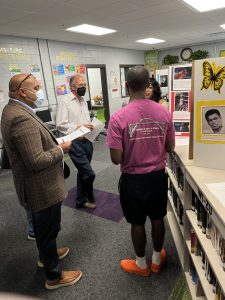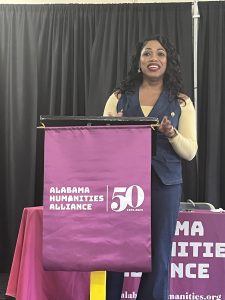The Alabama Humanities Alliance has named Madison County educators Shatia Howard and Alana McNeil as AHA’s 2024 Riley Scholars. The competitive Jenice Riley Memorial Scholarship is awarded annually to K-8 educators who excel in teaching history, civics, and geography. Since its origins, Riley Scholars have received funding to support creative history- and civics-related classroom projects.
Funded through the W. Edgar Welden Fund for Education, this scholarship is a tribute to the late Jenice Riley — a passionate educator and daughter of former Alabama governor and first lady Bob and Patsy Riley. Edgar Welden is a former AHA board member and a steadfast supporter of educational initiatives in Alabama. Since 2003, the Alabama Humanities Alliance has named 106 Riley Scholars and funded more than $100,000 in teacher scholarships.
Applications are now being accepted for AHA’s 2025 Jenice Riley Memorial Scholarships. Alabama educators are encouraged to apply by April 30, 2025.
About our 2024 Jenice Riley Scholars

Shatia Howard, Lakewood Elementary School
Huntsville City Schools | Kindergarten
Project: Diverse Friends, Happy Hearts
Student enrichment through promoting a deeper appreciation for diversity through literature. By introducing students to a range of cultures and backgrounds, students will enhance their social-emotional learning, empowering them to become more empathetic and compassionate individuals. By cultivating empathy, Howard aims to shape a more harmonious and inclusive future adult. Funding will help support purchasing books, supplies, and a buddy bench.
Alana McNeil, Farley Elementary School
Huntsville City Schools | 3rd Grade
Map reading is an essential life skill that modern students may need help with. In this project, students will learn how to read and use maps. Participants will integrate their math, reading, language, cooperative learning, and critical thinking skills. Funding will help support the purchase of maps, learning center supplies, and map puzzles.
Help us award more Riley Scholarships
Beginning in 2025, AHA will double the scholarship amount that Riley Scholars receive to support their efforts in the classroom and beyond. If you’d like to help us reward excellent Alabama educators, consider making a gift to AHA.
Learn more about AHA’s Riley Scholarships. Or contact Laura Anderson, AHA director of partnerships and outcomes: [email protected] or 205.558.3992.
About the Alabama Humanities Alliance
Founded in 1974, the nonprofit Alabama Humanities Alliance serves as a state affiliate of the National Endowment for the Humanities. Through our grantmaking and public programming, we connect Alabamians to impactful storytelling, lifelong learning, and civic engagement. We believe the humanities can bring our communities together and help us all see each other as fully human. Learn more at alabamahumanities.org.

 The 10-week Writing Our Histories pilot program culminated in an Alabama History Day contest on October 4, on the Mt. Meigs campus. Students presented their research as exhibits that colorfully highlighted what they’d learned on topics ranging from World War II and the Civil War to Alabama athletes and the civil rights movement. Students confidently and enthusiastically talked about what they’d learned, answering questions from Alabama History Day judges who work professionally as educators, historians, and authors. Teachers from other DYS campuses also attended to observe and bring the experience back to their own classrooms.
The 10-week Writing Our Histories pilot program culminated in an Alabama History Day contest on October 4, on the Mt. Meigs campus. Students presented their research as exhibits that colorfully highlighted what they’d learned on topics ranging from World War II and the Civil War to Alabama athletes and the civil rights movement. Students confidently and enthusiastically talked about what they’d learned, answering questions from Alabama History Day judges who work professionally as educators, historians, and authors. Teachers from other DYS campuses also attended to observe and bring the experience back to their own classrooms.





